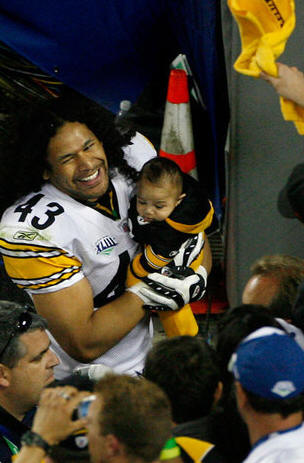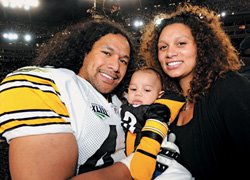The Mane Man
By Gina Mazza
Pittsburgh Magazine, August 2009

Troy with son, Paisius, named after Elder Paisius of Mt. Athos
Football is a given: How was this year’s Super Bowl experience versus XL? Tomlin versus Cowher? Goals for the coming season?
Fatherhood is new in Polamalu’s life since the birth of his son, Paisios, named after a beloved contemporary Greek Orthodox monastic, Elder Paisios, on Oct. 31, 2008. Has daddy-dom been life-changing? Will he encourage his son to play professional sports? How’s that beautiful new mom doing?
And last but not least: Faith. In order to properly meet Polamalu where he lives, this is the requisite, the grounding force that gives meaning to everything he does, every play he makes. Polamalu’s evident gratitude to the one who made him is marbled throughout our talk – from his training regime to his travels to Mount Athos, a monastic site in Greece, a place he calls “heaven on earth.”
While he has a reputation for being one of the NFL’s fiercest players, Polamalu would prefer “Tasmanian angel” over “Tasmanian devil” because his ball game is about glorifying God.
“Football is part of my life but not life itself,” he says. “Football doesn’t define me. It’s what I do [and] how I carry out my faith.”
Whether shooting a Coke Zero commercial or running up the sand hills on Manhattan Beach to train – which he’s probably off to do after this interview – Polamalu, 27, is refreshingly modest and introspective, choosing his words as precisely as he picks his spots on the gridiron. He’s intense when the occasion calls for it, and reveals with ease the depth of his character while philosophizing about matters outside the huddle. At the same time, there’s a lightness about Polamalu that gives you the impression that he’s not taking himself or his high-profile lifestyle too seriously.
Even after the Steelers gave him the biggest contract in team history, more than $30 million, extending him through 2011, nothing major has changed in the Polamalus’ lives. They’re still in the same house. He still trains with the same trainer. The number of commercial endorsements has increased as his popularity has soared, but Polamalu is cautious not to let this encroach on family time. The Polamalus live simply and quietly.
On Fatherhood
 Has becoming a father changed your life?
Has becoming a father changed your life?
I think becoming a parent encourages people to change their lives, but even before I was a father, I had an interest in bettering myself as a husband and as a person. The intensity is greater when you have a child, but I’ve always tried to be conscious of myself. In that sense, not much has changed in how I view my life. Obviously there’s another member of our family. The cool thing is that I’m able to bring my son when I work out, so training takes a lot longer!
Eight months old and already training?
Yeah, he sits and watches me. I think it’s important for a child to see his parents work. One day, God willing, he’ll be able to see a nice house, a nice car, good food – things that I didn’t have growing up. It’s important for him to realize that these things are obtained first of all through the grace of God but also through hard work. I come from [a childhood] where I would put every condiment imaginable on my cheeseburger just so I could feel more full. There’s value in that struggle. Parents don’t want their kids to experience that, but honestly I want my kid to experience that. I think parents have a tendency to give their kids everything they didn’t have. In turn, they grow up lacking important qualities – like courage and perseverance. If you grow up with any type of wealth or anything that is just given to you, you [may] lack these qualities. But first of all, it’s most important for Paisios to have a spiritual foundation.
You view your parental role as being a role model spiritually as well?
As a parent, I don’t want to talk out of both sides of my mouth; I don’t want to act a certain way and be another way. Not everybody has a material struggle, but everyone has a spiritual struggle. So with my son, it’s important for him to first understand the spiritual struggle and, as a result of that, know how to [deal with] the physical struggles that he has in his life – whether it’s dealing with not enough or too much of something.
So it’s a matter of being an example?
I think talking is overrated. Anybody in the world can talk about doing anything. The hardest thing is to do it. It’s important for my son to understand, for example, why we pray, why we go to church. It’s important for him to grow up in an atmosphere of watching us do it, to understand that nothing is given to you in life. Everything must be worked at in order to be obtained – whether it’s something material or it’s salvation.
If Paisios had the calling to become an Orthodox priest and not a fullback, you’d be elated?
Of course. Obviously the [athletic] pedigree is there in my family and my wife’s [and] people give me a hard time: “Troy, man, what if your son’s not a good athlete, or he grows up and he’s not big?” But I say, “How big do you need to be in order to be a priest?”
You’re not saying, “I want my son to grow up and be an athlete.”
No, not at all. I would like him to play sports because there are important lessons to be learned through sports – those qualities of perseverance, courage, hard work and ethics.
How is your wife, Theodora, adjusting to being a mom?
Oh, she’s the best. It’s given me a whole new perspective on my wife. Obviously, she’s had a lot of responsibility in dealing with me and my inadequacies. But now, to watch her wake up every night and feed him . . . you know, as a mother, you kind of give up your whole life. Obviously, I’m able to still do what I do. I play football. I do things that surround football. I get to train.
Some dads are naturals and others don’t know how to react once the baby is home. Do you feel comfortable in this role?
Oh yeah. I want to feed him, play with him, do all those fun dad things. We go swimming in the ocean. He’s crawling, but he’s not surfing yet.
Do you do diapers?
Oh, I hand him off to Grandma for that.
What is your greatest wish for your child?
Without a question, my greatest wish would be for him to understand the spiritual struggle and to be a pious Orthodox Christian. That’s what I want for myself, as well. Sometimes parents want their children to be what they never were. And that’s one thing that I am gracious for Paisios to have: that he’s able to grow up in the Orthodox church around monastics and priests that I was never able to experience as a kid – to grasp that, not take it for granted and really culture that.
Do you and Theodora still find time to garden, even with your new addition?
Yes, we’re growing tomatoes, broccoli, sunflower seeds, oregano, basil, sage, peppermint.
Still growing orchids?
I’ve tried but I don’t have enough patience for orchids. They’re so sensitive. Here’s what happened recently: It’s funny, I spent all last year trying to nurse this orchid to health. Finally spring comes along and I thought, I give up, I’m putting it outside. A month later, I come back to Pittsburgh and guess what? I look outside and it’s blooming like crazy! I can’t do what only God can do.
On Faith

Polamalu with his wife, Theodora, and their son, Paisios, on the field at Raymond James Stadium in Tampa, Fla., after the Steelers won Super Bowl XLIII.
It’s the struggle of good and evil, and with that comes the struggle with greed, jealousy, materialism, sexual morality, pride, all these types of struggles that we face every day, in every second of the day.
Your faith continues to evolve. In the past few years, you formally converted to Greek Orthodox. Where do you worship?
My wife and I go often to a Greek Orthodox monastery in Saxonburg [Nativity of the Theotokos], a monastery in Arizona, and several parishes in Pittsburgh. We like the monastery because it’s most serene there and we can talk to the monastics. To see their daily struggles really fascinates me.
What intrigues you about the monastic life?
For me, faith is to be simple in this way. If anybody believes in God and believes in the Holy Bible, how can you be in any grey area? I’m talking about myself here, how can “I” think one way and do another way? To me, Christianity is very black and white. Either you take it serious or you don’t take it serious at all. The monks’ example to me is that they take salvation seriously in every facet of their lives. This is a model for me as a Christian and for my family on how to live our lives.
Can you give an example of what inspires you?
There are so many, and I don’t mean to imply that everybody needs to live like a monk in order to be saved. For the Greek Orthodox monks, examples would be: they wear beards to cover their face so they’re not vain; they don’t have mirrors because they don’t want to look at themselves from being vain; they wear black because black is humility; they seldom talk because they don’t want to be proud or arrogant; they keep their eyes down because they don’t want their eyes to wander; they pray constantly.
The struggle between good and evil is very materialized with them. A lot of people have an understanding of this but it’s really just an oral proclamation that there is good and evil. To the monks, it’s hard as rock. It’s something they grasp daily. This is what I see in them and it amazes me: they’ve taken their struggle so seriously and in turn there’s so much grace in it. When you sit down with these monks, so much peace and love exudes from them.
Their faith is their passion. It makes me wonder if some day you might have that same calling.
I don’t think that everyone is meant to be a monastic. There are people who are meant to be married and those who are meant to be monastics. However, they are examples to us of how to live a pious life.
On my own spiritual path, I’ve felt at times that there’s a certain allure to that serene, sequestered lifestyle.
Yes, but I think it’s an understatement to say that their struggle is more intensified because their path is more intensified. There are tons of stories about these monks who have physical battles with these demons that fight them. It’s like, oh my goodness. In turn, they live in God’s grace so much that you think, no way, how can they have such angelic lives? Like the monks on Mt. Athos in Greece – this place is heaven on earth, there’s so much grace there. For 1,500 years, this place has been devoted solely to Christian spirituality. It’s untouched. Not even women are allowed there.
This is the place you visited two summers ago while on a pilgrimage?
Yes. There’s an amazing monk who lives in Arizona – Abbot Ephraim, my spiritual father. He’s the epitome of Mt. Athos brought to America
What’s the most important thing you’ve learned from him so far?
That you cannot have an experience of God without humility.

Leave a Reply